|
|
|
Sort Order |
|
|
|
Items / Page
|
|
|
|
|
|
|
| Srl | Item |
| 1 |
ID:
176025
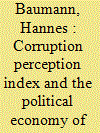

|
|
|
|
|
| Summary/Abstract |
The corruption perception index (CPI) compiled by Transparency International (TI) ranks countries by perceived levels of corruption. It is a reformist rather than a radical form of ‘statactivism’. First, I use Rose and Miller’s analytical framework to explain how corporate concerns come to dominate the CPI: How a neoliberal rationality is translated into a programme to govern corruption and then a technology – the CPI. A comprehensive survey of sources used to compile the CPI 2001–2016 shows that the vast majority were either produced for sale to corporate clients or were based on surveys of business elites. Second, I embed the index’s production into a wider political economy: TI workers are Gramscian intellectuals who put forward an interpretation of corruption that is non-threatening to corporate capital. This Gramscian framework holds wider relevance for analyses of the politics of global benchmarking.
|
|
|
|
|
|
|
|
|
|
|
|
|
|
|
|
| 2 |
ID:
167655


|
|
|
|
|
| Summary/Abstract |
Trapped in the premises of the transition ‘paradogma,’ democratization and authoritarian persistence literature are limited by a linear and continuous understanding of time, a gradualist view of transition, and a procedural definition of democracy. These analytical and normative strictures are compounded by a methodological nationalism that prevents an appreciation of how global factors shape the parameters for political transformation in the contemporary Middle East. Inspired by Gramsci’s theory of history, this article seeks to move beyond these limitations and explore the prospect of transition as rupture, away from democratization as strategy for ensuring duration of capitalist time, and toward democratic transition as epochal change beyond capitalism. By counterposing the effects of the two globalizations and the decolonization in between on the prospects of political transformation in the Middle East, this article argues that the Arab uprisings provide an opportunity for thinking globally and rupturally about political time, transition and democracy in the region.
|
|
|
|
|
|
|
|
|
|
|
|
|
|
|
|
| 3 |
ID:
141217
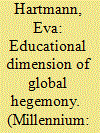

|
|
|
|
|
| Summary/Abstract |
This article seeks to further strengthen a sociological turn within International Relations (IR), which aims to make classical social theory fruitful for analysing the transnationalisation of societies. The focus is on the contribution of Antonio Gramsci’s analysis in this regard. A number of scholars have transferred his theory of hegemony to the global level in order to gain a more sophisticated understanding of global power and its transformation in reaction to the deepening of global economic integration. Surprisingly, most neo-Gramscian scholars have devoted little attention to education, despite the importance Gramsci assigned to this social sphere. The article seeks to overcome this lacuna with a study of the internationalisation of higher education since the end of the Second World War. Against the backdrop of the insights this case study provides, it will suggest some modifications of the neo-Gramscian account of hegemony with a view to taking the sociological turn more seriously, and to deepening our understanding of the social quality and the scale of the emerging postnational hegemony.
|
|
|
|
|
|
|
|
|
|
|
|
|
|
|
|
| 4 |
ID:
101379
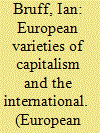

|
|
|
|
|
| Publication |
2010.
|
| Summary/Abstract |
This article develops a framework for analysing the distinctive national trajectories of European varieties of capitalism under the conditioning of 'the international'. It does so through a critical engagement with two prominent historical materialist literatures - transnational historical materialism and uneven and combined development. I argue that, in contrast to these contributions, a nationally-oriented perspective utilizing Antonio Gramsci's writings on 'common sense' has greater potential for narrowing the optic from broader concerns to fine-grained analysis. In particular, I focus on how articulations between the national and the international are constitutive of how humans make sense of the material basis for their existence.The Dutch variety of capitalism is then examined in order to demonstrate the advantages of utilizing this 'common sense' framework for political economy analysis.
|
|
|
|
|
|
|
|
|
|
|
|
|
|
|
|
| 5 |
ID:
146879
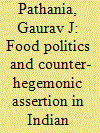

|
|
|
|
|
| Summary/Abstract |
Recently, heated debates concerning food politics have erupted at some of the most prestigious institutes of higher education in India. Students demand inclusion of beef and other meat in their hostel food menu, claiming hostel canteens represent only ‘mainstream’ Hindu culture. To boycott this culture and instil consciousness of their cosmopolitan life-world, they organise campus ‘Beef Festivals’ and publicly idolise so-called ‘demons’ of Hindu mythology. Using a Gramscian framework, this article explores the activism of marginalised students as counter-hegemonic and critically examines the ideological standpoints involved. As university spaces become significant sites to reinvent caste identities, we see that in their counter-hegemonic struggles, marginalised students employ the same tools and symbols of meat and myth as their opponents. It is argued that this strategy ultimately risks contradicting the goal of their activism and may block broader visions of an equal and just society.
|
|
|
|
|
|
|
|
|
|
|
|
|
|
|
|
| 6 |
ID:
178138
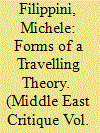

|
|
|
|
|
| Summary/Abstract |
Since 2000, Gramscian concepts have been undergoing an unprecedented process of dissemination, and this process has occurred along two specific axes: The geographic axis and the disciplinary axis. This process, which is also a hybridization resulting in political innovation, often has been interpreted in terms of fidelity/infidelity to Gramsci’s ideas, and as a result has been interpreted as somewhat of a degenerative process. In contrast, my analysis focuses on the transit of Gramscian theory, that is, on what ideas transit, on how they transit, and why they transit rather than starting with a presupposed ‘original’ theory or the arrival points of ‘corrupted’ or ‘translated’ theory. By looking beyond an essentialist notion of his theory, this inquiry into Gramscian concepts ends up discussing the problems of contemporary history and politics rather than simply the revival of interest in a Sardinian Marxist.
|
|
|
|
|
|
|
|
|
|
|
|
|
|
|
|
| 7 |
ID:
178137


|
|
|
|
|
| Summary/Abstract |
This Special Issue is based on an academic collaboration going back to a conference held at the Università degli Studi di Bari in Italy, on 30 November and 1 December 2017, and entitled ‘Gramsci in the Arab World.’ The conference organizers were Gennaro Gervasio, Patrizia Manduchi and Alessandra Marchi in collaboration with the Centro Interuniversitario di Ricerca per gli Studi Gramsciani, the Gramsci Foundation of Italy, the GramsciLab at the University of Cagliari, and the International Gramsci Society (IGS). It marked the 80th anniversary of Antonio Gramsci’s death. The longest period of Gramsci’s incarceration (June 1928–November 1933) was in Turi, a prison not far from the conference site. Delegates were able to view a selection of Gramsci’s actual prison notebooks, which his sister-in-law, Tatiana Schucht (d. 1943), successfully saved from prison. These provided us a vivid encounter with the traces and intellectual results of struggles from an Italian and European past, an encounter that underlined connections with a Middle East and North Africa beset with political incarceration, problems of revolutionary leadership, counter-revolution, proto-fascism, state violence, colonisation, socioeconomic crisis, and right wing populism.
|
|
|
|
|
|
|
|
|
|
|
|
|
|
|
|
| 8 |
ID:
175052
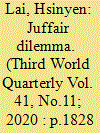

|
|
|
|
|
| Summary/Abstract |
This paper challenges ‘the myth’ of the demise of Arab nationalism after the Arab–Israeli War in 1967 that appears in the scholarship of international relations of the Middle East (IRME). I argue instead that Arab nationalism plays a constitutive role in ideologically linking the issue of Bahrain’s post-colonial state sovereignty and foreign policy on alignment, showing its political salience after 1967 in what I call ‘the Juffair dilemma’: the Al Khalifa regime’s dilemma in aligning with the US after Bahrain’s formal independence. Drawing on Antonio Gramsci’s ‘national-popular collective will’ to re-conceptualise Arab nationalism, the paper further argues that the impact of Arab nationalism on Bahrain’s alignment was revealed through a political struggle between the Al Khalifa regime and the Bahraini New Arab Left, corresponding to wider regional and international anti-imperialist movements in the context of the Cold War. This struggle manifested Arab nationalism as a non-collective will, in which ideological disconnections existed between ‘the people’ and the regime, in Bahrain. It then created the context where the issue of alignment was related to the contestation of sovereignty and the Palestinian question, which was the source of the Al Khalifa regime’s dilemma in making alignment with the US.
|
|
|
|
|
|
|
|
|
|
|
|
|
|
|
|
| 9 |
ID:
178142
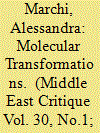

|
|
|
|
|
| Summary/Abstract |
The increasing interest in Antonio Gramsci’s thought constitutes an important source of inspiration in the study of the Middle East and North Africa, particularly in the post-2011 Arab uprisings period. The popularity of the Italian Marxist thinker is to be found in the original applications and uses of Gramscian categories, which have given rise to a growing secondary literature, especially outside Italy and Europe, beyond Gramsci’s immediate background and beyond the context of his own historical and political analysis. The revolutionary moment of 2011, the crisis of hegemony, and thus the crisis of ‘the State as a whole’ (stato integrale), is present in different ways in Arab countries, where many groups within civil society live, work, compete and protest tirelessly. This article draws attention to the less explored Gramscian concept of the “molecular” and argues for the importance of reading molecular, even fragmented, ways to resist the manufacturing of consent and the dominant hegemony during revolutionary moments, such as the pre- and post-2011 periods. The concept of the ‘molecular’ (molecolare) is fundamental to shedding light on the potentially transformative implications of everyday contentious actions and helps us to scrutinise what kind of hegemony is possible in Arab-Mediterranean countries today. Furthermore, Gramsci enables us to confront multiple, singular experiences of ‘others’ – which already are shaping contemporary history in different world regions while being intertwined with global history. This article shows how the theoretical, methodological and political potential of Gramscian interpretations is vital to – and can be enriched and renewed by – a promising, ongoing interdisciplinary dialogue.
|
|
|
|
|
|
|
|
|
|
|
|
|
|
|
|
| 10 |
ID:
153728
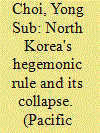

|
|
|
|
|
| Summary/Abstract |
Ideological leadership through the Party was at the core of the North Korean leaders’ hegemonic rule over the people, which resulted in the great popularity of Kim Il-sung. Marketisation in the wake of the economic crisis, however, significantly impaired the mechanism for rule by consent, especially by triggering the influx of outside information and undermining the Party's ideological education activities. The economic crisis led the state to adjust the mechanism of consent and coercion in such a way that the state's control over society could be restored by relying more on rule by force, which was demonstrated by the much stricter penal system, bloody purges and, most of all, military-first politics. This, nonetheless, was a temporary measure because, in Guha's terms, ‘dominance without hegemony’ would not be durable in the long term. The regime can sustain itself in the long-term only through the reinstatement of the consent mechanism, which disintegrated owing to the marketisation. However, as the marketisation, being beneficial to those who have power as well as ordinary people, is irreversible in North Korea today, the reestablishment of hegemonic rule would not be attainable.
|
|
|
|
|
|
|
|
|
|
|
|
|
|
|
|
| 11 |
ID:
174561
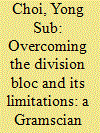

|
|
|
|
|
| Summary/Abstract |
Colonialism affects post-colonial social formations in a variety of ways. Japanese colonial rule had a far-reaching influence on South Korean post-colonial social formation. Most legacies of colonialism diminished as time went by, but one legacy of colonialism continued or even increased its effects on the South Korean political economy from the 1960s – namely, the division of Korea. This article provides an alternative Gramscian approach to the analysis of the social formation of South Korea, with due consideration of the division of the peninsula. For that purpose, it introduces the concept of a division bloc, adapting Gramsci’s concept of a historical bloc to develop an analysis of a social formation that is unique to South Korea. Then, I explicate the two events that have been most damaging for the division bloc – the 1997 economic crisis and the 1998–2007 inter-Korean reconciliation – describing them as an organic crisis and a hegemonic project, respectively. Following this, I present reasons why the counter-hegemonic efforts of liberal nationalists to overcome the division bloc failed.
|
|
|
|
|
|
|
|
|
|
|
|
|
|
|
|
| 12 |
ID:
153253
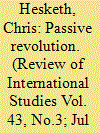

|
|
|
|
|
| Summary/Abstract |
In this article, I argue that Antonio Gramsci’s concept of passive revolution makes a foundational contribution to International Relations (IR), yet has been relatively under appreciated by the broader discipline. Within the Historical Sociology of International Relations, uneven and combined development has recently been postulated as a key trans-historical law that provides a social theory of the ‘international’. Drawing from, but moving beyond these debates, I will argue that passive revolution is a key conditioning factor of capitalist modernity. I will demonstrate how the concept of passive revolution is the element that explains the connection between the universal process of uneven development and the manner in which specific combinations occur within the capitalist era as geopolitical pressures, in tandem with domestic social forces become internalised into geographically specific state forms. It therefore offers a corrective to the frequently aspatial view that is found in much of the literature in IR regarding uneven and combined development. Additionally, passive revolution provides a more politicised understanding of the present as well as an important theoretical lesson in relation to what needs to be done to affect alternative trajectories of development.
|
|
|
|
|
|
|
|
|
|
|
|
|
|
|
|
| 13 |
ID:
141138
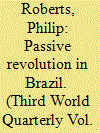

|
|
|
|
|
| Summary/Abstract |
This article examines transformations of the role of religion in Brazil, focused on two transitions within the national political economy. A Gramscian framework of analysis is used to investigate the shift from import substitution industrialisation to neoliberalism, and the varying role of religion within class struggles in each period. The central argument is that Brazil has moved from a period of ‘passive revolution’ to one of ‘hegemony’, and that the role of religion has changed significantly in this period. The article examines ideas, institutions and social forces, with particular attention to the Landless Workers Movement and its relationship with Liberation Theology.
|
|
|
|
|
|
|
|
|
|
|
|
|
|
|
|
| 14 |
ID:
141208
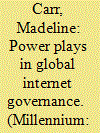

|
|
|
|
|
| Summary/Abstract |
The multi-stakeholder model of global Internet governance has emerged as the dominant approach to navigating the complex set of interests, agendas and implications of our increasing dependence on this technology. Protecting this model of global governance in this context has been referred to by the US and EU as ‘essential’ to the future of the Internet. Bringing together actors from the private sector, the public sector and also civil society, multi-stakeholder Internet governance is not only regarded by many as the best way to organise around this particular issue, it is also held up as a potential template for the management of other ‘post-state’ issues. However, as a consequence of its normative aspirations to representation and power sharing, the multi-stakeholder approach to global Internet governance has received little critical attention. This paper examines the issues of legitimacy and accountability with regard to the ‘rule-makers’ and ‘rule-takers’ in this model and finds that it can also function as a mechanism for the reinforcement of existing power dynamics.
|
|
|
|
|
|
|
|
|
|
|
|
|
|
|
|
| 15 |
ID:
144281
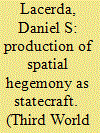

|
|
|
|
|
| Summary/Abstract |
In recent years Brazil has deployed a military takeover of dozens of favelas. Presenting data collected from 2012 to 2014 in one of the favelas, I argue that the process of ‘pacification’ is an attempt at passive revolution, which depends more on manufacturing spatial hegemony through non-military strategies than on the war of manoeuvre that is currently being undertaken. This is developed through an articulation of Gramsci’s theoretical framework with Lefebvre’s perspective of the production of space, which exposes the failure to overcome the fragile presence of state in the territory through everyday state formation.
|
|
|
|
|
|
|
|
|
|
|
|
|
|
|
|
| 16 |
ID:
166010
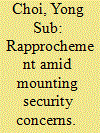

|
|
|
|
|
| Summary/Abstract |
The 1998–2007 inter–Korean reconciliation was paradoxical because there were aggravating military tensions during the same period. To solve the security puzzle, this paper employs a Gramscian approach and argues that the reconciliation was pursued as hegemonic projects by the ruling political groups in North and South Korea. In South Korea, the economic crisis in 1997 led counter-hegemonic liberal nationalists to take political power, and the new ruling political group implemented the engagement policy toward Pyongyang to attain hegemony. In North Korea, the existing ruling political group sought to reconcile with Seoul, mostly for material gains to maintain hegemony by stopping the ongoing economic crisis from developing into a political crisis without a full–scale reform of the system. In the process, each capitalized on unication nationalism, which had a strong national– popular force because of the division of Korea. The rapprochement was carried out primarily to exhibit their contributions to unication, which could be signicantly conducive to their winning the domestic struggle for hegemony.
|
|
|
|
|
|
|
|
|
|
|
|
|
|
|
|
| 17 |
ID:
178143
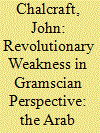

|
|
|
|
|
| Summary/Abstract |
This article sets out a Gramscian perspective on revolutionary weakness in the MENA. It aims not at a top-down analysis of how activists were crushed, but at a bottom-up analysis evaluating activist activity. Drawing on a reading of Gramsci, fieldwork in Egypt, and recent research on MENA protest, it adopts a Gramscian concept of transformative activity and applies it to the MENA since 2011. It argues that the basic elements of transformative activity in Gramsci include subaltern social groups, conceptions of the world, collective will, organisation, strategy/tactics, and historical bloc. It argues that transformative activity involves the organic articulation of these distinct moments in a complex, differentiated unity. On the basis of this view, the article shows how sense can be made of revolutionary weakness in the MENA since 2011 through a critical analysis of problems in the organic articulation of revolutionary mobilisation.
|
|
|
|
|
|
|
|
|
|
|
|
|
|
|
|
| 18 |
ID:
109965
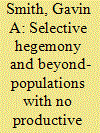

|
|
|
|
|
| Publication |
2011.
|
| Summary/Abstract |
A significant shift in the form of the political economy since the 1980s is frequently described as a shift from the welfare state to neoliberalism, the latter either referring to new principles of rule or more broadly to include the nature of the economy. The paper argues that it is more fruitful to explore how these changes reflected a shift in the dominance of forms of capital-principally from production to finance. The dominant class blocs in the former period pursued hegemonic projects described here as expansive; in the latter period such projects became selective. Insofar as finance capital seeks security through diversification (benefitting from difference) and is not itself productive of value, so it relies on and [re-]producesrespectively, a) selected populations invested in distinctions, and b) an absolute residual population. The politics of the former is one of negotiation, of the latter counter-politics beyond negotiation. Exploration of this difference becomes a crucial task for social analysis.
|
|
|
|
|
|
|
|
|
|
|
|
|
|
|
|
| 19 |
ID:
178605
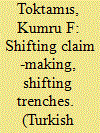

|
|
|
|
|
| Summary/Abstract |
This article explores the dynamics of state-formation in Turkey during the AKP regime by questioning its claim of an almost two decades long continuity heading towards the centennial of the Republic of Turkey in 2023. Eclectically drawing on four different, yet related, theories of conflict, power and (visual) narrative; i.e. Gramscian ‘war of position,’ Contentious Politics perspective of (de)democratization, dialogical principle and visuality, the article presents a comparison of the claim-making of the two official publications; now defunct the Silent Revolution, and Towering Power Turkey, published in 2013 and 2018, respectively, to demonstrate the contrast between the pre-hegemonic and hegemonic self-presentation claims of the AKP regime, and indicates that its regime change is the re-entrenchment of many of the postulates of the Kemalist regime it originally aspired to challenge. The tenets of this analysis is located within the intersection of political sociology and cultural studies.
|
|
|
|
|
|
|
|
|
|
|
|
|
|
|
|
| 20 |
ID:
188185
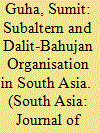

|
|
|
|
|
| Summary/Abstract |
This article analyses the history of Marathi-speaking India after 1600 in order to understand why Dalit and Bahujan movements first arose in this region before spreading across South Asia. It argues that this was an explicable consequence of a tradition of social action long extant at the village and supra-village levels—that self-organisation had been yoked to hegemonic power, but not thereby erased. I then invoke Antonio Gramsci’s concept of subalterns as subordinated fractions of a larger whole to analyse this phenomenon. Finally, I trace the breaks and continuities that enabled the leadership of Jyotirao Phule and B.R. Ambedkar.
|
|
|
|
|
|
|
|
|
|
|
|
|
|
|
|
|
|
|
|
|